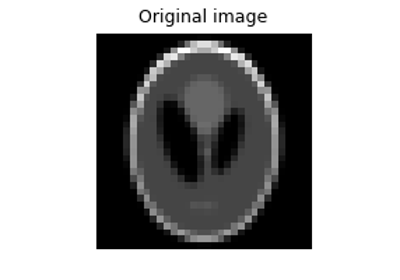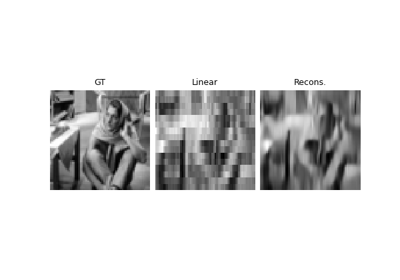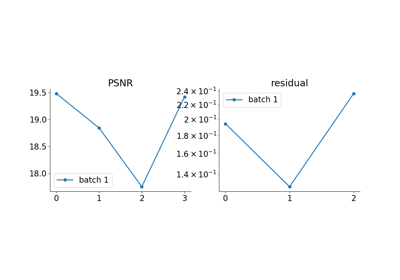OptimIterator#
- class deepinv.optim.OptimIterator(g_first=False, cost_fn=None, has_cost=True, **kwargs)[source]#
Bases:
ModuleBase class for optimization iterators.
An optim iterator is an object that implements a fixed point iteration for minimizing the sum of two functions \(F = f + \lambda \regname\) where \(f\) is a data-fidelity term that will be modeled by an instance of physics and \(\regname\) is a regularizer. The fixed point iteration takes the form
\[\qquad (x_{k+1}, z_{k+1}) = \operatorname{FixedPoint}(x_k, z_k, f, \regname, A, y, ...)\]where \(x\) is a “primal” variable converging to the solution of the minimization problem, and \(z\) is a “dual” variable.
Note
By an abuse of terminology, we call “primal” and “dual” variables the variables that are updated at each step and which may correspond to the actual primal and dual variables from (for instance in the case of the PD algorithm), but not necessarily (for instance in the case of the PGD algorithm).
The implementation of the fixed point algorithm in
deepinv.optim.FixedPointis split in two steps, alternating between a step on \(f\) and a step on \(\regname\), that is for \(k=1,2,...\)\[\begin{split}z_{k+1} = \operatorname{step}_f(x_k, z_k, y, A, ...)\\ x_{k+1} = \operatorname{step}_{\regname}(x_k, z_k, y, A, ...)\end{split}\]where \(\operatorname{step}_f\) and \(\operatorname{step}_{\regname}\) are the steps on f and g respectively.
- Parameters:
- forward(X, cur_data_fidelity, cur_prior, cur_params, y, physics, *args, **kwargs)[source]#
General form of a single iteration of splitting algorithms for minimizing \(F = f + \lambda \regname\), alternating between a step on \(f\) and a step on \(\regname\). The primal and dual variables as well as the estimated cost at the current iterate are stored in a dictionary
Xof the form{'est': (x,z), 'cost': F}.- Parameters:
X (dict) – Dictionary containing the current iterate and the estimated cost.
cur_data_fidelity (deepinv.optim.DataFidelity) – Instance of the DataFidelity class defining the current data_fidelity.
cur_prior (deepinv.optim.Prior) – Instance of the Prior class defining the current prior.
cur_params (dict) – Dictionary containing the current parameters of the algorithm.
y (torch.Tensor) – Input data.
physics (deepinv.physics.Physics) – Instance of the physics modeling the observation.
- Returns:
Dictionary
{"est": (x, z), "cost": F}containing the updated current iterate and the estimated current cost.
- relaxation_step(u, v, beta)[source]#
Performs a relaxation step of the form \(\beta u + (1-\beta) v\).
- Parameters:
u (torch.Tensor) – First tensor.
v (torch.Tensor) – Second tensor.
beta (float) – Relaxation parameter.
- Returns:
Relaxed tensor.
Examples using OptimIterator:#

Random phase retrieval and reconstruction methods.

PnP with custom optimization algorithm (Primal-Dual Condat-Vu)


